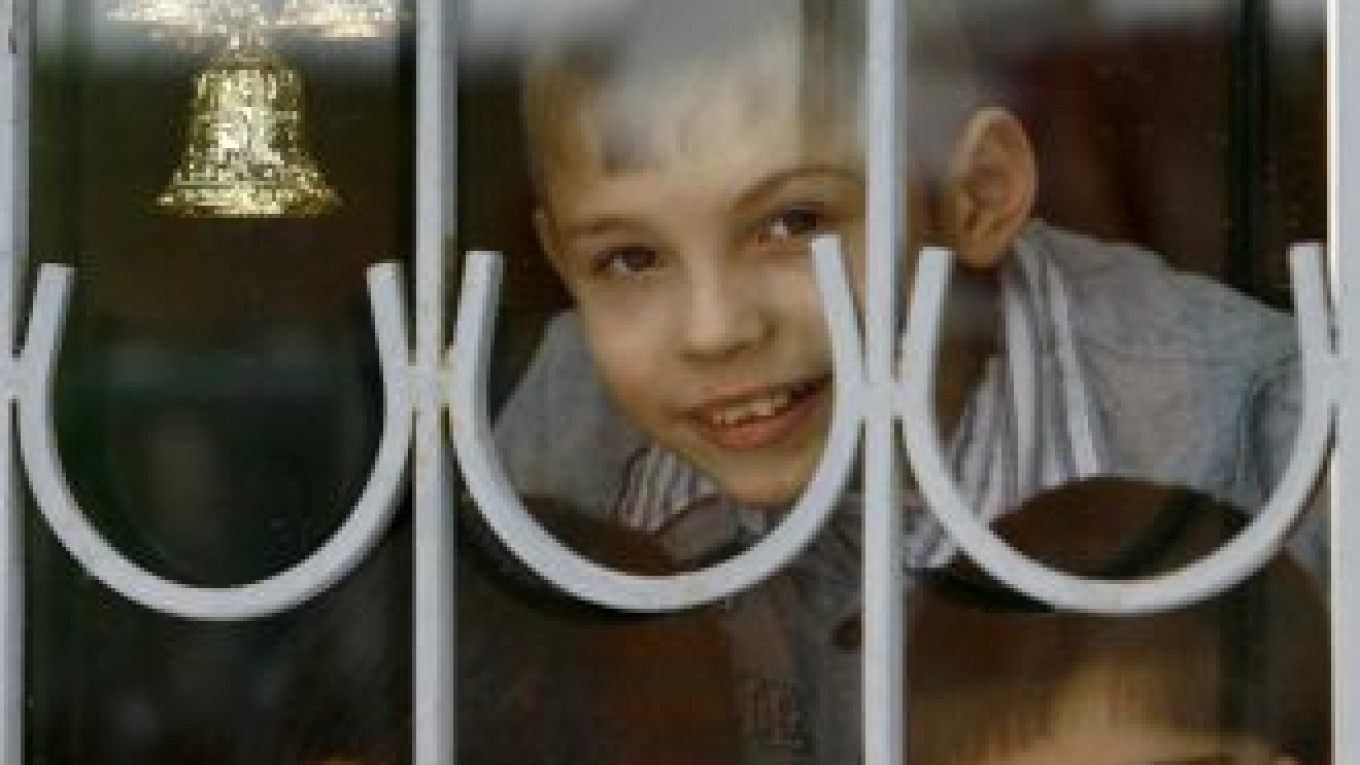President Vladimir Putin on Thursday signaled that a proposed ban on U.S. adoptions could not come into force for at least a year because of Russia’s obligations under a new agreement.
Putin, who was asked about his stance on the ban by several journalists at his annual news conference, broke his silence on the issue by acknowledging that he might not be able to sign it into law because it contradicts the U.S. adoptions agreement, which he signed last summer.
“The agreement says that if one country decides to quit, it must notify the other side a year in advance. [Undoing that agreement] is not so simple,” Putin said.
Russia demanded the agreement in 2010 after a U.S. mother, saying she could not care for her adopted 7-year-old son, sent him back to Russia on a plane by himself. The agreement, which Russian officials have said will better protect the rights of Russian children, came into effect Nov. 1.
“We have an agreement with the State Department,” Putin said. “I need to look at it. This is not an idle inquiry.”
The State Duma is expected to approve the bill banning U.S. adoptions in a third and final reading? Friday. Supporters have said it will take effect Jan. 1.
Putin left open the possibility that he might sign the bill, which is named after Dima Yakovlev, a 21-month-old boy who died after being left in a hot car by his adoptive U.S. father in 2008. The president said he hadn’t made up his mind because he still needs to read the bill.
“Depending on what is written, I will make a decision,” Putin said, adding that he would read it later that day or sometime Friday.
The legislation, which easily passed a second reading Wednesday in the United Russia-dominated Duma, is widely seen as Russia’s response to the U.S. decision to approve the Magnitsky Act earlier this month. The U.S. law bans Russians implicated in human rights violations.
Putin said the Russian bill was not a tit-for-tat reaction but an “emotional but adequate” response to the violation of Russian children’s rights in the U.S.
While praising most U.S. adoptive parents as “honest and decent people,” Putin complained that U.S. authorities have not allowed Russian representatives to, among other things, monitor the trials of U.S. parents accused of wrongdoing.
“This is about the attitude of American officials in situations involving the violation of children’s rights,” he replied to a reporter who criticized the proposed ban on adoptions. “Do you consider this normal? You like this? What are you, a sadomasochist? There is no need to humiliate the country! We do not forbid adoption by foreigners in general. There are other countries besides the United States.”
Eight of the more than 60 questions at the news conference touched on the adoption issue in one form or another.
Putin also suggested that the Russian bill had broad public support, saying Russians didn’t like foreigners adopting Russian children.
But human rights organizations and more than 100,000 ordinary people who signed an online petition on Novaya Gazeta’s website disagreed. “I hope that Putin won’t sign the bill,” veteran rights activist Lev Ponomaryov said, Interfax reported. “We consider the bill outrageous. The public is against it. If the authorities place any importance on public opinion, then the bill won’t be signed.”
A Novaya Gazeta journalist asked Putin at the news conference whether the authorities would reconsider the Dima Yakovlev bill in light of the fact that the newspaper’s petition had attracted so many signatures. Putin replied that the Duma would look at the petition.
Putin has said that any petitions that garner more than 100,000 signatures must be reviewed by officials.
Duma Deputy Dmitry Gudkov, a Just Russia member who voted against the bill, said most United Russia deputies also oppose the bill but don’t dare vote against it. “You have no idea how those deputies who couldn’t vote against the scoundrels’ bill are jealous of my freedom,” he said on Twitter.
Related articles:
A Message from The Moscow Times:
Dear readers,
We are facing unprecedented challenges. Russia's Prosecutor General's Office has designated The Moscow Times as an "undesirable" organization, criminalizing our work and putting our staff at risk of prosecution. This follows our earlier unjust labeling as a "foreign agent."
These actions are direct attempts to silence independent journalism in Russia. The authorities claim our work "discredits the decisions of the Russian leadership." We see things differently: we strive to provide accurate, unbiased reporting on Russia.
We, the journalists of The Moscow Times, refuse to be silenced. But to continue our work, we need your help.
Your support, no matter how small, makes a world of difference. If you can, please support us monthly starting from just $2. It's quick to set up, and every contribution makes a significant impact.
By supporting The Moscow Times, you're defending open, independent journalism in the face of repression. Thank you for standing with us.
Remind me later.


